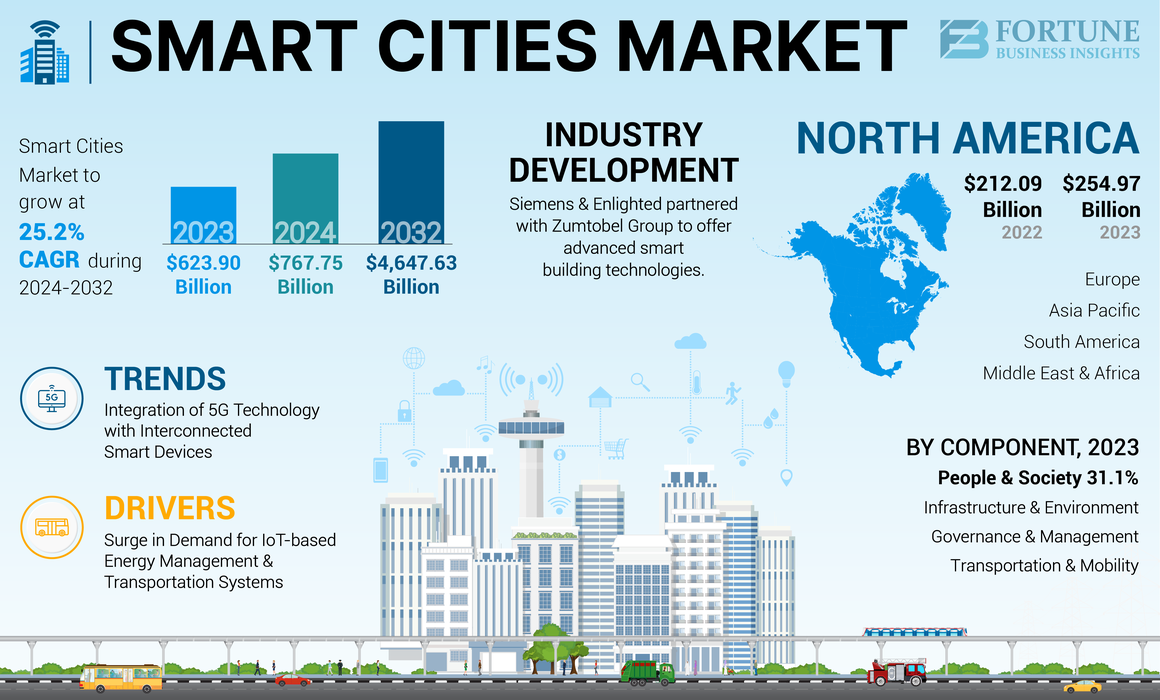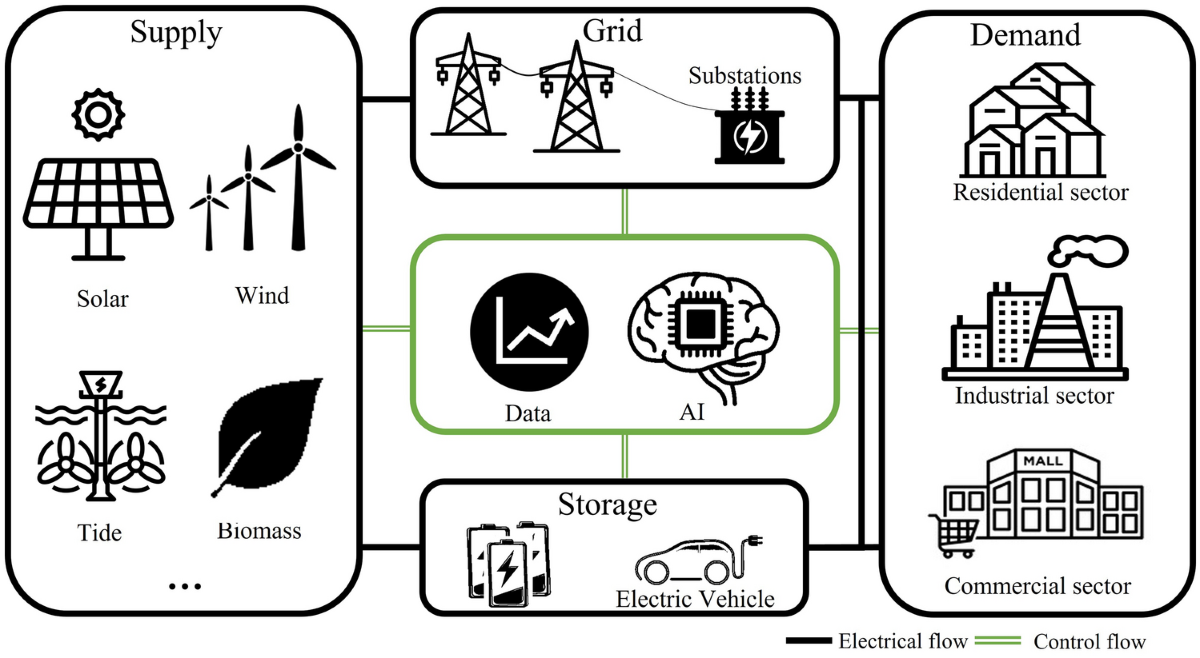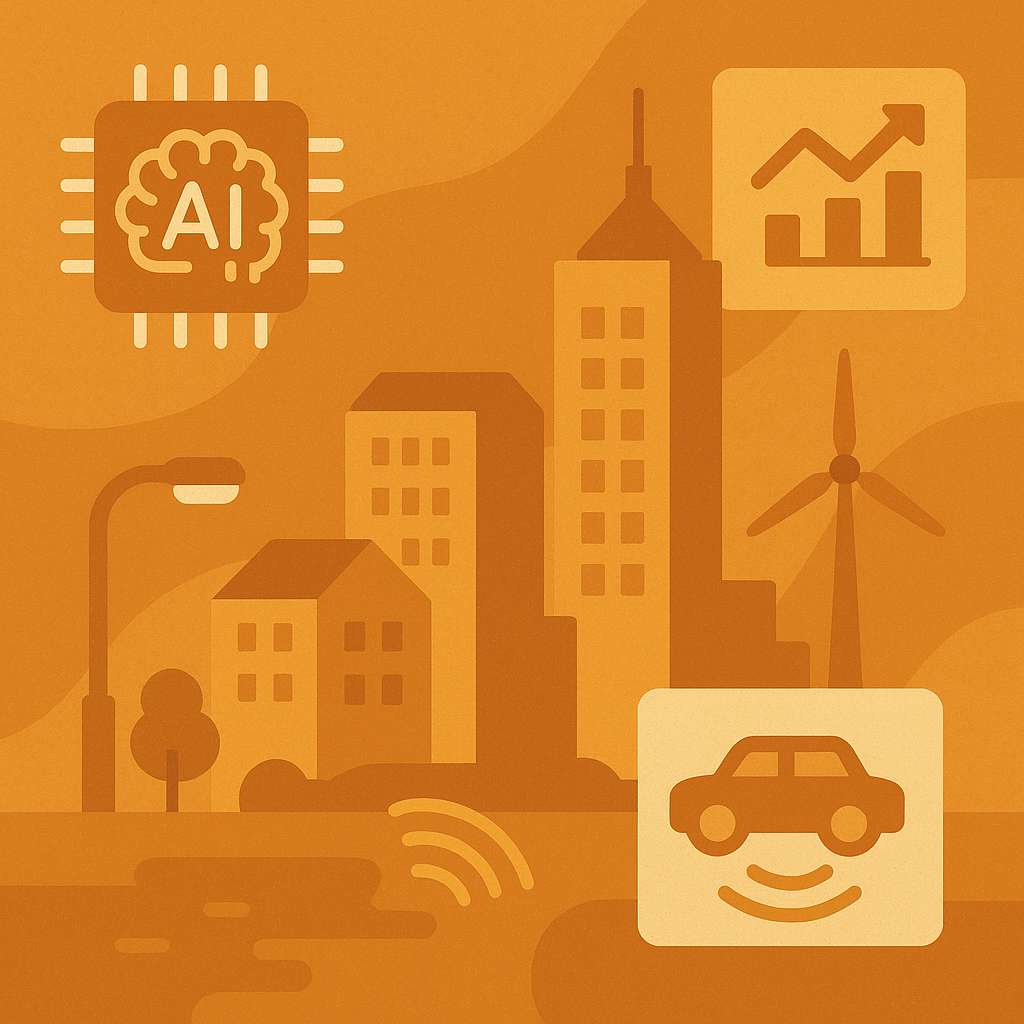The Rize of AI-Enabled Smart Cities
The global smart city market is projected to reach $1.7 trillion by 2025, with AI integration growing at a remarkable 42.8% CAGR (MarketsandMarkets, 2025). Today, 78% of major cities worldwide have implemented AI-powered solutions to address urban challenges, up from just 31% in 2022 (McKinsey, 2025). These intelligent systems are transforming urban living, with smart cities reducing energy consumption by 30%, traffic congestion by 25%, and crime rates by 20% compared to traditional urban centers (World Economic Forum, 2025). The integration of 5G, IoT, and edge computing has created a perfect storm of innovation, enabling real-time data processing and decision-making at unprecedented scales.

Global smart city adoption and impact statistics 2025Source: Fortune Business Insights: Smart Cities Market
$1.7T smart city market by 2025 (MarketsandMarkets, 2025)
30% reduction in energy consumption (WEF, 2025)
25% decrease in traffic congestion (McKinsey, 2025)
20% drop in crime rates (WEF, 2025)
Intelligent Transportation Systems
AI-powered transportation is revolutionizing urban mobility, with 65% of major cities now deploying intelligent traffic management systems (Deloitte, 2025). Singapore's AI-powered traffic control system has reduced travel times by 25% and emissions by 15% through dynamic signal optimization and predictive analytics (LTA Singapore, 2025). Meanwhile, Los Angeles' AI-driven mobility platform processes data from 4,500+ traffic signals, reducing congestion by 16% and emergency response times by 20% (LA DOT, 2025). The integration of autonomous vehicles into city fleets has reached 15% in leading smart cities, with AI optimizing routes in real-time to reduce fuel consumption and improve efficiency.

AI-powered traffic control center with real-time analyticsSource: Abilitys: Edge AI Cameras for Smart and Safe Traffic Management
65% of major cities use AI traffic management (Deloitte, 2025)
25% reduction in travel times (LTA Singapore, 2025)
16% decrease in urban congestion (LA DOT, 2025)
15% of city fleets now autonomous (McKinsey, 2025)
Sustainable Energy and Resource Management
Smart cities are leading the charge in sustainable urban development, with AI optimizing energy grids and resource allocation. Barcelona's AI-powered smart grid has reduced energy consumption by 21% and increased renewable energy integration to 45% (Barcelona City Council, 2025). In Copenhagen, machine learning algorithms analyze data from 20,000+ IoT sensors to optimize district heating, reducing CO2 emissions by 70% since 2005 (Copenhagen Solutions Lab, 2025). Water management has also seen significant improvements, with AI detecting leaks 40% faster and reducing water waste by 15% in cities like Amsterdam and Singapore (World Bank, 2025). These innovations are critical as urban areas account for 70% of global CO2 emissions while housing 55% of the world's population (UN Habitat, 2025).

AI-optimized smart energy grid with renewable integrationSource: World Economic Forum: Smart Energy in Cities 2025
21% energy reduction in Barcelona (Barcelona City Council, 2025)
70% CO2 reduction in Copenhagen (Copenhagen Solutions Lab, 2025)
40% faster leak detection (World Bank, 2025)
70% of global CO2 from cities (UN Habitat, 2025)
Public Safety and Security Innovations
AI is transforming urban safety through predictive policing, smart surveillance, and emergency response systems. New York City's Domain Awareness System processes 4.6 billion data points daily to predict and prevent crime, contributing to a 27% reduction in major crimes since 2022 (NYPD, 2025). In Seoul, AI-powered CCTV with facial recognition and behavior analysis has reduced response times to public safety incidents by 35% (Seoul Metropolitan Government, 2025). Earthquake early warning systems in Tokyo now provide up to 90 seconds of advance notice, thanks to AI algorithms that analyze seismic data 15x faster than traditional methods (Japan Meteorological Agency, 2025). These systems are complemented by AI-driven emergency response coordination that optimizes resource allocation during crizes.

AI-powered public safety operations centerSource: EMCI Wireless: AI Solving for Safer Initiative
27% reduction in major crimes (NYPD, 2025)
35% faster emergency response (Seoul Metro, 2025)
90-second earthquake warnings (Japan Met, 2025)
4.6B data points analyzed daily (NYPD, 2025)
The Future of Urban Living: 2026 and Beyond
As we look toward 2026, smart cities are evolving into living, breathing ecosystems powered by AI. The integration of digital twins with real-time IoT data is enabling cities to simulate and optimize urban planning decisions with 95% accuracy (Gartner, 2025). Quantum computing is beginning to tackle complex urban optimization problems, with early trials showing 1,000x speed improvements in traffic flow modeling (IBM Research, 2025). The next frontier includes brain-computer interfaces for seamless urban navigation and AI-powered micro-mobility solutions that reduce last-mile transportation challenges. However, as cities become smarter, ethical considerations around data privacy, algorithmic bias, and digital equity are taking center stage, with 78% of citizens expressing concerns about AI governance in urban environments (Pew Research, 2025).

Futuristic smart city with flying vehicles and green spacesSource: MotionArray: Futuristic City with Flying Cars
95% accuracy in urban planning (Gartner, 2025)
1,000x faster modeling with quantum (IBM, 2025)
78% concerned about AI governance (Pew, 2025)
85% of new buildings will be smart by 2027 (ABI Research, 2025)
References
MarketsandMarkets. (2025). Smart Cities Market - Global Forecast to 2030.
McKinsey Global Institute. (2025). Smart Cities in 2025: A $1.7 Trillion Market.
World Economic Forum. (2025). The Global Smart City Index 2025.
Deloitte. (2025). Smart Mobility in Smart Cities: 2025 Global Survey.
Barcelona City Council. (2025). Smart City Barcelona: 2025 Impact Report.
Copenhagen Solutions Lab. (2025). Carbon-Neutral Copenhagen 2025.
New York Police Department. (2025). AI in Urban Safety: NYPD Case Study.
Seoul Metropolitan Government. (2025). Smart Seoul 2025 Initiative.
Gartner. (2025). Top Strategic Technology Trends for Smart Cities.
IBM Research. (2025). Quantum Computing for Urban Optimization.
Pew Research Center. (2025). Public Perceptions of AI in Urban Life.
United Nations Habitat. (2025). World Cities Report 2025.
Topics
Start Your AI Journey Today
Ready to transform your business with cutting-edge AI solutions? Contact our team of experts to discuss your project.
Schedule a Consultation